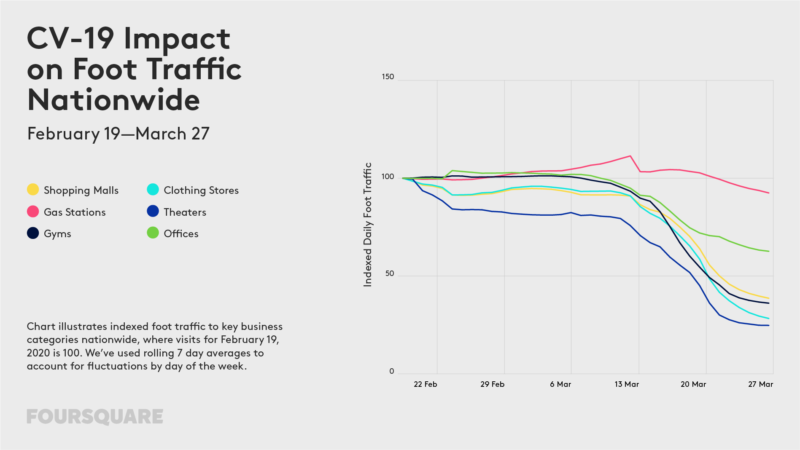What location data can tell us about the COVID-19 pandemic
Tools used for ad analytics can provide enormous social insights and even speed recovery, but they require clear safeguards.
Mobile location data is a versatile tool for marketers; it can act as a kind of real-world cookie substitute, help define audiences, provide competitive insights and enable online-to-offline attribution. And it’s now being deployed in the service of virus tracking as well as offering a near real-time look at the condition of the (offline) economy.
Tracking the Progression of the Virus
Many people have already seen the video (below), which illustrates the power of location data. It shows the migration of Florida spring break revelers, who subsequently tested positive for COVID-19, spread the virus to other areas of the country as they return home. The location data come from X-Mode, the visualization is by Tectonix.
Both South Korea and China successfully used GPS data to track the infection path of the virus. Those efforts were instrumental in arresting its spread. China’s authoritarian government was not concerned with privacy or issues of opt-in consent. However, in the UK, there’s an effort underway to use GPS data but adapt the approach to a democratic society with strong privacy norms.
Israel has also tapped into what was described as a “secret trove” of cellphone data to track the virus. And the U.S. is now starting to explore and use some of the same types of location data but in an “anonymous” way that doesn’t rely on individual consent — although consumer consent needs to be provided at some point in the supply chain.
The objective of the program, now being implemented in the US, “is to create a portal for federal, state and local officials that contains geolocation data in what could be as many as 500 cities across the U.S.,” according to the Wall Street Journal.
Because location data allows public health officials to track carriers and monitor the efficacy of social distancing, we should use it. There’s almost a “moral imperative.” However, once the crisis is over, this data could be used for less than entirely ethical purposes. But, arguably, that risk already exists. It’s up to legislators to protect the public against unwarranted “surveillance.”
A parallel development, from a company called Kogniz Health, involves deployment of “fever detection” cameras that can capture the body temperature of anyone walking by — presumably to identify “spreaders.”
Foot Traffic: Visualizing the Recession
Another more traditional use of location data is store visitation measurement. Yelp has recently released data on consumer search and engagement in local business categories. According to the company’s data, for example, grocery stores are seeing much more traffic and engagement; restaurants and bridal shops are way down by contrast. However, this data is a proxy for real-world behavior – or what would be real-world behavior in a normal time.
Other companies that offer location intelligence are capturing how stay at home orders are affecting local businesses and offline behavior. The include Foursquare, NinthDecimal, GroundTruth, Cuebiq, Placer.ai and others. They’re all publishing reports about store visitation and consumer movements, which are generally consistent.
Foursquare, for example, has been documenting the decline in foot traffic to airports and hotels, movie theaters, retail stores, restaurants and bars. But it has also captured the increase in visitation to drug stores, grocery stores, certain warehouse stores (e.g., Costco), parks and fast-food chains. (Factual, Cuebiq and NinthDecimal have similar data.)

This kind of “economic activity” data is obviously valuable to investors, economists and policy makers. The capacity to track the path of infection would also yield the ability to predict and potentially prevent it through proactive intervention. And post-virus movement data could also be used to inform public policy and potentially speed economic recovery.
Privacy, Surveillance and the Aftermath of the Virus
The genie is out of the bottle with location data. It’s an extremely powerful tool to understand group behavior, economic trends and the impact of public policy, beyond all the things it can do for marketers. We need to use this data for our collective benefit, especially now. Indeed, if it can accelerate a conclusion of the pandemic it must be used.
Yet consumers are understandably concerned about being tracked and about potential abuses of their location data. The companies involved (Google, Apple, Facebook and others) together with the government need to bring full transparency to its use cases so people understand and willingly participate in public health technology initiatives.
Trust and transparency are the keys to mutually beneficial uses of these tools by marketers and the government. In their absence, we’ll continue to see — or may increase — the tension between the buyers of location data (marketers, government) and the ultimate providers of the data, consumers themselves.
That’s where rules and regulation can come in and bridge the gap to mitigate public concerns and mediate differences. That’s also the difference between a virus tracker and a surveillance tool.
Contributing authors are invited to create content for Search Engine Land and are chosen for their expertise and contribution to the search community. Our contributors work under the oversight of the editorial staff and contributions are checked for quality and relevance to our readers. The opinions they express are their own.
Related stories